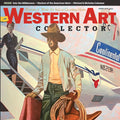Art collectors of the West
By Medicine Man Gallery on
Magnificent Obsession (excerpt)
Courtesy Southwest Art, October 2011
Dr. Mark Sublette
Santa Fe, NM
What kind of artwork do you collect? Maynard Dixon is the largest part of my collection. I collect all thea rtists that I represent in Medicine Man Gallery. I also have a fairly significant collection of Ed Mell and Native American art.
How woud you describe your approach to collecting? I'm always looking for something that excites my imagination. If it makes me laugh, smile, or giggle, or if it upsets me to some extent, it's rewarding to have in my collection.
How long have you been collecting? I started as a kid, but I've been collecting actively for about 25 years.
What was the first piece you purchased? A little pottery bird from Santa Clara, which I still have. I still have everything.
What's your most recent acquisition? It's a large painting that Ed Mell is doing for me on commission. I'm anxious about that.
What's on your wish list for the future? The Mell was on my wish list, but I don't believe in wish lists really. I believe it's whatever comes your way that excites you. It's fun when I do shows at the gallery; if the artist creates something I like, it might be the next piece. Or the next piece may just walk through the door.
Is there a piece that got away? I don't know if there has been. But sometimes you have to be patient. I did sell a painting by Maynard Dixon that I really loved, then I bought it back by paying more money. The way I buy or collect, I always try to give it my best shot. If it's something I want, I make a decision, and I buy it or I don't, and I don't regret it. If you love something, and it's in the realm of your abilities to purchase it, you should just buy it.
Why do you collect? Because I have to. It always seemed to be important. For me, it completes my life in a way that I can't explain. Having visual stimulus around you, in whatever form, excites that portion of your brain that fully appreciates what it means to be human.



